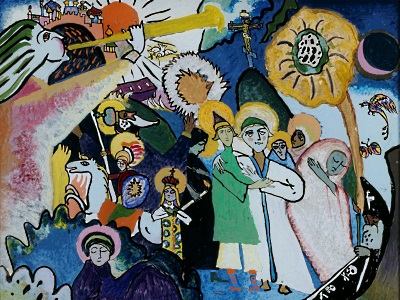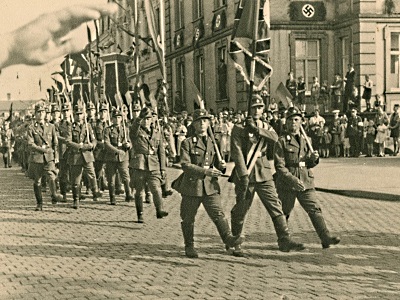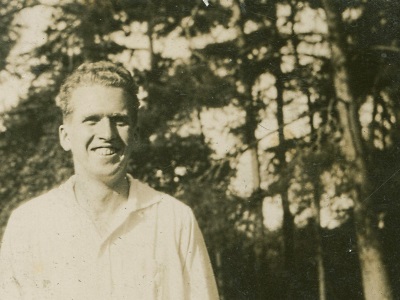“The Conscience and Its Restoration” is the second chapter of volume two of Inner Land, The Conscience.
Arnold opens this chapter with an observation on the delicate nature of the conscience: “It is like a supersensitive recording instrument, influenced by every change of weather and liable to be seriously damaged by any shock” (32). Because of this deeply impressionable character, the believer needs to be on guard against things that approximate the way of Jesus but ultimately lead away from him. The true path commends itself in a clarity and simplicity that requires the confidence of faith. In contrast, “there are cases in which a sick conscience lets no thought arise and no step be taken without submitting it to serious misgivings and harsh judgments. Such a sickness fills the whole of life with grievances and dissatisfaction, with self-laceration and injustice” (34). The only satisfactory answer to this kind of self-accusation is found in God’s grace and forgiveness, providing space for people to acknowledge their shortcomings and depend on him alone.
Arnold proceeds to examine the status of the conscience in contemporary German society. He discerns a general unwillingness to let it speak. Rather, it is “silenced or despised” (36). Consider the influence of Sigmund Freud in the area of sexuality, an example that Arnold takes to be representative of the marginalization of the conscience. Now people pursue “all kinds of sexual perversions” that Freud argues have been “repressed into the subconscious by the conscience” (38).1
In circles influenced by Freud, repressed urges are revived and acted on. But to Arnold, the childhood repression of various libidinal urges is a good thing and one that does not need to be reversed: “A comparison could be made with a war veteran who is emotionally disturbed, or with the morbid excitement leading up to a civil war: in both cases, the conscience has to repress the passions that urge people to shoot fellow human beings in the streets of their hometown” (40). So must certain sexual desires remain “repressed” in the subconscious.
Arnold speaks generally of “perversions” that are “committed on one’s own body, on the opposite sex, or on the same sex” (38). His analysis suggests non-procreative sex, and abortion: “the smallest souls that want to be called into life are prevented or annihilated. Little souls wait in vain to be called out of eternity” (40). Finally, as is typical of his argumentation, Arnold considers the inverse in particular Christians who repress all sexual urges. But the Spirit-led life is not one of either excess or extreme privation. It finds its true expression in faithful and conscientious sexual practice.2
However, it is hard for a believer to realize an ordered sexuality in a society that is not rightly ordered: “Christian marriage cannot be demanded outside the whole context of life that is called the ‘kingdom of God’ and the ‘church of Jesus Christ’” (43). Arnold takes the Sermon on the Mount as his point of departure. A sexuality that heeds Jesus’ call coincides with “not having property, not bearing arms, not insisting on rights, being free from a judging spirit, being forgiving, and loving one’s enemies” (45). This is the broader context in which faithful sexuality is to take place, rather than being an isolated practice. All of these commitments can be summed up in a singular commitment to love, given to us by the Spirit – and not for our own sakes but for the sakes of people all over the world knowing and being included in this love. Returning to his main theme, Arnold concludes, “This love alone fulfills the longing of our conscience” (47).
Aside from a lack of vision for the kingdom of God in all areas of life, the believer faces another challenge in the allure of idols: “Kings, foreign dictators, and other leaders [Führer] arise to bind our consciences and lead us away from Christ,” Arnold says to illustrates this assertion, with a probable reference to Hitler (48).3 Whatever strength an occupied conscience might otherwise have, it is at least clear that it cannot serve God, who demands wholehearted, exclusive devotion. Nonetheless, Arnold cautions, “To hit out at a conscience that is sick and feeble does no good. Even an erring conscience deserves to be treated with consideration and respect” (49). Such a conscience will not be forced into submission; rather, the Spirit of light must come upon it and lead it to freedom.
The conscience finds assurance in its leadings within the wider context of Christian community. Here, where other consciences seek the same ends, “the unity between the church and the words and lives of the apostles and their prophecy is proof that the voice speaking in human hearts is God’s voice” (50). Where such assurance is lacking, there is likely to be a disjunction between the call of God and human action. In the same way, the right exercise of conscience requires faith, just as the converse is true. And while the individual still struggles against sin, the conscience can no longer accuse, whatever the crime: “The grace of [Jesus’] blood … continually purifies our conscience through the Holy Spirit” (53–54).
In this connection, through the power of the Spirit the church is given the authority to forgive sins. False prophets also pronounce forgiveness, but this doesn’t mean anything. Where the church forgives, however, true repentance follows, as well as an “attack” on all that is evil: “where there was no peace, peace must be made; where everything was in chains, freedom must dawn; where injustice ruled, justice must take its place; where love and joy had grown cold, the joy of love breaks through; and where each one lived for himself, community comes into being. An all-out campaign against evil is launched: no area of life can escape being attacked” (57). Insofar as this represents a genuine movement of the Spirit, it will never result in a self-satisfied conscience that prematurely believes its work has come to an end. Indeed, the conscience still depends on Jesus’ sacrificial blood, conferred through the Spirit. This is an undeserved gift, independent of any human action.
Arnold teases out his theology of the conscience with concrete examples from contemporary German politics. The revolutions and political violence following the end of the First World War “revealed the evil spirit of our time” (64). The conscience did not judge according to its standard in Jesus but was ruled by hate and fanaticism. And in 1932, when social democrat, communist, centrist, and Nazi representatives found themselves in a parliamentary deadlock, two different elections were held, both yielding little in terms of a way forward. Arnold recalls, “One man had to be taken to a mental hospital as a result of his desperate efforts to make up his mind in the utter confusion of his political ideas” (65).4 He ended up commending every party, and Arnold suggests, “It may well be that he was more sensible and reasonable than the blind mass of voters” (65).5 For the other voters, though, “without looking for guidance from their consciences, they have presumed to make weighty decisions over the destiny of whole peoples” (65).6
In contrast, the Spirit-directed conscience recognizes that “Jesus Christ remains today and forever exactly the same as he was in the time of Augustus and Herod and Pilate, no matter how many thousand times his clear picture is changed and falsified by this relativism” (66). Any political power that makes claims contrary to those of Jesus demonstrates its lack of knowledge of him. Thus, believers, too, will find clarity in political questions only insofar as their consciences are grounded in Jesus: “When the conscience lives in the Holy Spirit, it is so completely immersed in the Spirit that it breathes no other air than that of the Spirit. … As a conscience in the Holy Spirit, it glorifies Christ, brings to mind all that Jesus said, and leads to the active expectation of his future” (69).
As such, the Christian conscience cannot “become the slave of a human being,” that is, a political authority (73). Paraphrasing Matthew 23:8, Arnold writes, “You shall not call each other Führer. Only one is your Master, but you are brothers” (73).
Continue:
Introduction
1.1. The Inner Life
1.2. The Heart
1.3. Soul and Spirit
2.1. The Conscience and Its Witness
2.2. The Conscience and Its Restoration
3.1. The Experience of God
3.2. The Peace of God
4.1. Light and Fire
4.2. The Holy Spirit
5.1. The Living Word
1. Eberhard reflects a little later, “The deliberately chosen word ‘repression’ is enough to deprecate the whole activity of the conscience and throw suspicion on it” (39).
2. Eberhard is not referring to sexual purity as a moral virtue, but rather to a general embarrassment toward or even a prudish disgust for the sexual aspects of human life.
3. Führer had a very general sense in Eberhard’s time. It took on an increasingly narrow connotation with the rise of Nazism, popularized as a more informal term for Hitler than (Reichs-) Kanzler, (Imperial) Chancellor. This association has been crystallised in subsequent culture. See the other uses of Führer on pp. 72–73 and this series on Eberhard Arnold and National Socialism.
4. It is unclear whether this is based on a real event or Arnold is using the anecdote as an illustration.
5. In 1921, Arnold wrote or co-wrote a lengthy reflection on Christianity and electoral politics, challenging the assertion that true Christians can only vote for certain parties – usually socially conservative or nationalist parties. Rather, Christians should either join a particular party and fight to bring its vision in line with the kingdom of God; vote along these lines; or reject the electoral system altogether. As far as we know, Bruderhof members either voted according to their conscience or abstained up until the early thirties. In November 1933, the community decided on a united response to Hitler’s plebiscite on withdrawal from the League of Nations, offering statements rather than a “yes” or potentially dangerous “no.” And in 1934, Arnold declares, “We cannot put the sword into Hitler’s hand by voting. … [W]e recognize that the sword must be as long as the world is not Christian. But as Christians we are called not to hand the sword to anyone. Even though the government uses its sword, we cannot take part in it.” Meeting transcript, August 9, 1934 (EA 262).
6. Neither of the 1932 elections (July and November) resulted in the formation of a majority government. The Nazis took advantage of the deadlock, with Hitler elbowing his way into the position of chancellor in January 1933 (though not without wide support). Another, ostensibly free election was held in March 1933, where the Nazis violently suppressed communist and social democrat opposition to their rule.


